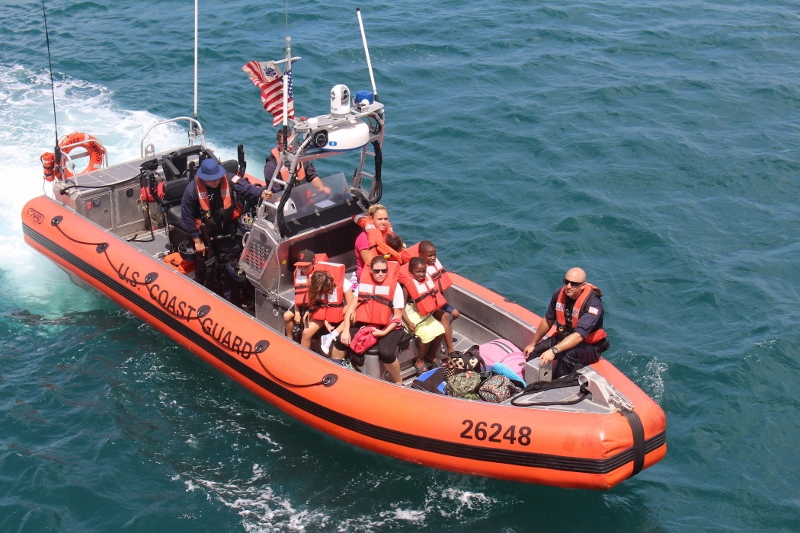Ports from south Florida to South Carolina were reopened by Wednesday morning, bringing critically needed fuel supplies to a region struggling with flood damage and power outages from Hurricane Irma.
Military and government sealift operations stepped up in the U.S. Virgin Islands, as civilian volunteers in neighboring Puerto Rico worked with the Coast Guard to organize more boatlift efforts to help islanders.
Port Everglades, Miami, Port Canaveral, Palm Beach, Fernandina and Jacksonville all opened to some extent with safety restrictions Tuesday and Wednesday, as did Brunswick and Savannah, Ga., and Charleston, S.C. Those openings followed the lead of the Port of Tampa, which opened Tuesday afternoon to allow landing critical fuel shipments.

The Coast Guard buoy tender Maria Bray works to reset aids to navigation near Mayport, Fla. Coast Guard photo.
The first arrival at reopened Port Canaveral late Tuesday was likewise a tanker, reported the Canaveral Pilots. Gasoline and diesel shortages, along with continuing power outages that keep filling stations closed, continue to be a major obstacle to the recovery and for residents trying to get home and back to work.
Florida Gov. Rick Scott said gasoline deliveries are a priority, and he directed state police to escort tankers to their destinations. Many of them are filling up at Port Tampa Bay, a distribution center for fuel to central Florida, where 10 tank vessels were scheduled to arrive beginning late Tuesday.
A day after the first vessels arrive, about half the services stations in the Tampa area were still out of action, according to the tracking site Gasbuddy.com.

A fuel tanker was the first vessel to call at a reopened Port Canaveral, Fla, Tuesday. Canaveral Pilots photo.
Troops, supplies and equipment continued to arrive in the U.S. Virgin Islands, where St. Thomas and St. John residents face shortages of food, water and shelter on the ravaged islands.
Within days of the hurricane strike, civilian boat operators in Puerto Rico began moving to help the islanders with supplies and evacuating people who needed to get off. Volunteers organizing the “Puerto Rico Navy” are coordinating with the Coast Guard and Customs and Border protection to account for volunteer vessels and ensure they are operating safely and within maritime law and customs requirements.
The Coast Guard has been cautious about volunteer mariners, and officials at the Seventh District headquarters in Miami stressed Tuesday that the agency “highly recommends mariners do not transport people or cargo aboard recreational vessels to the U.S. Virgin Islands or other islands impacted by Hurricane Irma.”
But the Coast Guard also recommends that mariners who want to help contact organizers by email at [email protected] to assist and confirm they can safely operate their vessel within safety parameters.
While most ports are now open, operators must beware of damaged docks and other infrastructure and debris in the water, officials warned. All boats must have proper safety equipment for their size and number of people on board, and must not be overloaded. A 6 p.m. curfew in effect in the Virgin Islands applies to mariners as well.
The Coast Guard warned against unlicensed boat owners trying to make money off of relief efforts: “Recreational vessel operators are reminded that representing themselves or their vessels for hire to transport passengers or cargo is illegal. Violators are subject to civil penalties, vessel seizure and possible criminal charges.”




